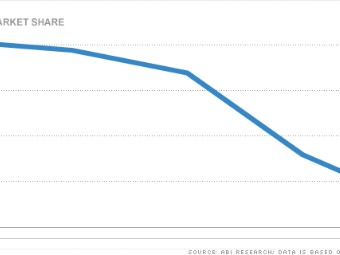

With BlackBerry 10, Research in Motion is trying to get its once-iconic phones back into a market that has left it behind.

No manufacturer has been hit harder than Nokia (NOK) by the mobile phone market's dramatic reshaping.
In 2008, Nokia was the leader by a mile. It shipped nearly 61 million smartphones that year and controlled a dominant 41% share of the market, according to ABI Research.
But as Android ascended, manufactures like Samsung, Sony and HTC adopted Google's operating system and built devices around it that rivaled the iPhone. Nokia's primary operating system, Symbian, fell far behind.
Nokia CEO Stephen Elop threw down the gauntlet in early 2011, firing off a now-famous memo declaring the current situation untenable.
"We poured gasoline on our own burning platform," he wrote to Nokia's staff. "We had a series of misses. We haven't been delivering innovation fast enough."
His solution: Go all in with Microsoft. Nokia ditched Symbian, scrapped its work on new operating systems, and became the flagship manufacturer for Windows Phone.
Nokia's Lumia line of Windows phone drew strong reviews, but it hasn't yet saved Nokia. In 2012, Nokia's smartphone shipments dropped to 35 million and its market share plunged to 5%.